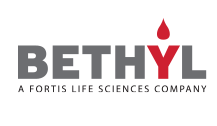Rabbit anti-Phospho PCNA (Y211) IHC Antibody Affinity Purified

Product Details
Specifications
Immunogen for IHC-00219 was a phosphorylated synthetic peptide, which represented a portion of human proliferating cell nuclear antigen (GeneID 5111) around tyrosine 211 according to the numbering given inentry NP_002583.1. Antibody was affinity purified using an epitope specific to Phospho PCNA (Y211) immobilized on solid support. Immunogen for IHC-00219-T was a phosphorylated synthetic peptide, which represented a portion of human proliferating cell nuclear antigen (GeneID 5111) around tyrosine 211 according to the numbering given inentry NP_002583.1.
Additional Product Information
PCNA (Proliferating Cell Nuclear Antigen) was first identified as a factor expressed in the nuclei of replicating cells. PCNA plays a role in both DNA synthesis and repair. PCNA functions as a processivity factor for DNA polymerase by acting as a DNA clamp that tethers the polymerase catalytic units to the DNA template. The structure of PCNA is that of a trimeric ring that encircles and slides along replicating DNA. PCNA interacts with and is regulated by several proteins involved in cell cycle control and check point processes.
Alternate Names
ATLD2; cyclin; DNA polymerase delta auxiliary protein; PCNA; proliferating cell nuclear antigen
Applications
Epitope exposure is recommended.
Epitope exposure with citrate buffer will enhance staining.
Extended incubation with primary antibody (16-24 hours) at room temperature is recommended.
Likely to work with frozen sections.
